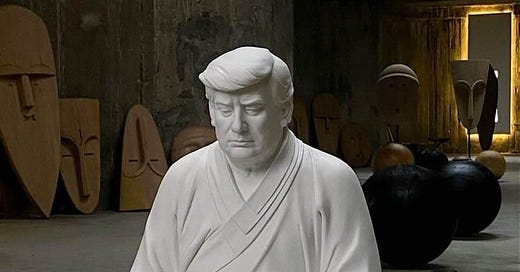The deepest root of totalitarianism, for Del Noce, lies in its diminishment of the capacity of reason both in terms of its universality and its extent. It is a totalitarian way of thinking but it is not recognized as such because it is generally more indirect; it operates less by imposition than simply removing the recognized bases for political criticism. Any morally-based argument to anything the state does is by definition invalid because such claims are not based on the positivist understanding of what reason is. Thus, it becomes harder and harder to come up with any arguments at all against contemporary developments. Justice is reduced to whatever comes next.
Modern political thinking, through the impacts of decomposed Marxism and what is left of Enlightenment reason (positivism), cuts us off from the entire realm of the transcendent, from which we traditionally derived our moral norms. As implied at the conclusion of the most recent argument against positivism, healthy democracies are rooted in the contrast between what is happening and what should be happening. When that distinction is clear, we can have a robust discussion about where we really should be going that is coherent because all the parties largely share the understandings of good, or right, or true, or beautiful, upon which such discussions are based. Yet, it is one of the distinctive features of our culture that we can no longer do this. Once the transcendent standards are gone, nothing that can really be called a standard can replace them. Even the vocabulary changes in noticeable ways.
Del Noce already noted six decades ago that the dichotomies of true-false, good-bad, and beautiful-ugly were giving way to a new vocabulary.11 For example, in the academy a work was to be valued if it met the criteria of “significant,” “original, ” “sincere,” or “progressive.” And this is the only way it can be. When the criteria for measuring true vs. false, good vs. bad, and beautiful vs. ugly are eliminated (which is exactly what happens with the negation of transcendence), then everything is on the same level; new criteria have to be invented, which will most assuredly be ephemeral, banal, and superficial when not completely without meaning. We must not underestimate how radical these changes are. Catholic progressives (about whom more will be said later) never seem to get the point, but neither do most of the rest of the people.12
The technological society is the society that measures life by non-transcendent, non-religious criteria, paramount among them is well-being. Technological society is the society of well-being.13 It is worth noting that philosophy in the sense of the term that prevailed prior to the advent of technological civilization cannot really exist in such a society. I am reminded of an old cohort in college, a Philosophy major who had liberated himself from theology, and was fond of saying that “theology was the study of things that did not exist.” This is essentially the fate of philosophy in the society of well-being. Its questions, having nothing to do with what life is all about (material well-being) are essentially meaningless, appealing to concepts that are believed not to exist. Conversations about morality may continue to exist, but are seen as cultural rather than properly philosophical.
This developing ideology, formed from the particular way Marxism decomposed, in conjunction with an Enlightenment thought itself influenced by this same decomposition, had a particularly significant impact on progressivism. Del Noce takes a long , historical look at progressivism, finding its genesis in the decade between 1930 and 1940.14 It became the ideology of those fighting Fascism. Consistent with Del Noce’s belief that it is foundational philosophical assumptions that drive history, he advances the thesis that progressivism was founded on a profound error of judgment concerning contemporary history. Benedetto Croce, the intellectual leader of Italian anti-Fascism, argued that Fascism was the outgrowth of a “morbid romanticism.” The key to the error was that the progressives interpreted this romanticism as something in continuity with tradition. Therefore, the solution was a radical break with tradition altogether, both philosophically and institutionally. This led directly to the embrace of the dimensions of Enlightenment thinking that underlined breaking with the past. They embraced all the rhetoric about mankind “coming of age,” now able to think for himself.15 (Ultimately, they also embraced DeSade and eroticism.)
In this account, Fascism is the result of the rebellion against this “enlightenment” by the people who lacked the courage to make the transition, who sought a refuge in a past that could not be brought back. This would be the governing assumption as progressivism moved forward. Del Noce underlines how fundamental the error is here along two major lines. First of all, Fascism had nothing really to do with tradition, the Fascists being more like Marxists in their rejection of transcendence, and in their modern and revolutionary goals. Secondly, a truly successful anti-Fascism that would also be anti-Communist would have seen in tradition the moral and intellectual basis for an authentic reform in Europe. But progressivism was locked in, and would only become more and more radically anti-traditional as time went on.



